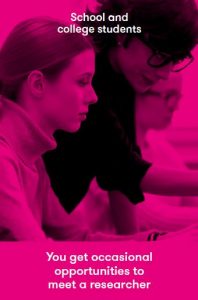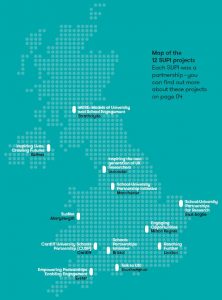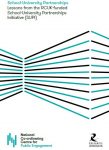
Sophie Duncan, NCCPE (https://www.publicengagement.ac.uk)
School students in East Anglia publish a research paper in a peer reviewed academic journal. English teachers in Bristol are inspired and equipped to teach on the Romantics at GCSE. Young people in Milton Keynes support the production of free resources to help them (and others) Manage their Money. Researchers in Manchester gain new skills as they support school students doing extended project qualifications.
These sentences hint at some of things that have been happening as part of School-University Partnerships Initiative (SUPI), an experiment to see whether it was beneficial for schools and universities to partner together to bring cutting edge research into the classroom.
Funded by Research Councils UK, SUPI involved 12 projects, each involving partnerships between schools and universities keen to build effective ways to work together.

One of the SUPI PoP Tool Character Cards.
With such rich learning, we hope the project inspires others to think hard about the opportunities presented by school-university partnerships, and how they can be realised. To support this we have created two resources:
- SUPI Lessons: a booklet summarising the key lessons learnt from the programme, illustrated by taster case studies.
- SUPI Perspectives on Partnership (PoP): a brilliant resource to help schools and universities consider how they might like to work together. We know that schools and universities want different things from working together – the resource illustrates the experiences of teachers, school students, researchers, and university brokers for different types of partnerships – and is a great tool to talk about what everyone is hoping to achieve.
Over the last 4 years I have had the privilege of working on this project. We have learnt a lot, have developed a range of effective approaches to working together, and have sought to share our learning through the development of open access resources and tools.
The SUPI projects have provided a rich place to learn about the dynamics of effective partnership working, and a reminder that partnership working is both demanding and hugely rewarding. It has opened up new ways of thinking about partnership working between schools, colleges and universities, captured key insights into what helps and hinders, and has seen the development of really innovative and inspiring projects.
There were lots of highlights from over the 4 years, here are three I am particularly enthused by:

Map of the 12 SUPI Partnerships.
- Many of the SUPI partnerships sought to involve school students in authentic research, for instance through the Extended Project Qualification for A level students. This commitment to experimenting with ‘real’ research was a platform for really creative partnership working between researchers, teachers and students.
- The programme sought to develop mutually beneficial, long term, strategic partnerships between schools and universities. An excellent example of such a partnership is the partnership between Denbigh Teaching School Alliance and the Open University. The team came together to write a bid for SUPI funding, and the governance, decision making, inspiration and hard work was shared. It is testament to the partnership that it continues to weave its magic even though the SUPI funding has come to an end.
- Whilst the programme sought to develop long term partnerships, we learnt that for many schools that isn’t their top priority – with many just wanting to access resources, or to have specific visits from researchers into the classroom environment. Cardiff University took a great approach to supporting this – by working with teachers to create a differentiated offer for schools – mediated through a web portal.
To realise the potential of school-university partnerships, we need to see a change in how schools and universities approach this type of working, investing time and resource into long term partnerships that have mutual benefit at their heart. It has been heartening to see the teams involved in the SUPI project begin to address this challenge.

Lessons from the RCUK-funded School-University Partnership Initiative (NCCPE, 2017)
Reference
National Co-ordinating Centre for Public Engagement (NCCPE) (2017). School-University Partnerships: Lessons from the RCUK-funded School-University Partnership Initiative. Bristol: NCCPE, https://www.publicengagement.ac.uk/sites/default/files/publication/nccpe_supi_lessons.pdf.
